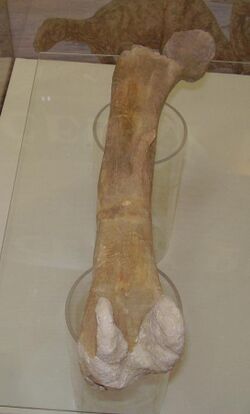Earth:Peruc–Korycany Formation
From HandWiki
| Peruc–Korycany Formation Stratigraphic range: Cenomanian | |
|---|---|
| Type | Geological formation |
| Sub-units | Peruc Member, Korycany Member |
| Underlies | Bila Hora Formation |
| Overlies | Metamorphic basement |
| Lithology | |
| Primary | Sandstone, Mudstone, Conglomerate |
| Location | |
| Country | |
| Extent | Bohemian Cretaceous Basin |
The Peruc–Korycany Formation is a geologic unit of Upper Cretaceous age, located mostly in the Czech Republic. It is the oldest unit of the Bohemian Cretaceous Basin, which overlies Silurian-aged metamorphosed rocks of the Bohemian Massif. It consists of fluvial to shallow marine sediments.[1]
Fossil content
Dinosaurs
Dinosaur fossil remains about 94 million years old (Cenomanian stage) were found in 2003 near the village Mezholezy (Miskovice), by Kutná Hora. This small basal ornithopod dinosaur was officially named Burianosaurus augustai in 2017.[2]
| Dinosaurs | |||||
|---|---|---|---|---|---|
| Genus | Species | Presence | Material | Notes | Images |
| Burianosaurus | B. augustai | Korycany Beds.[2] | A well-preserved femur.[2] | A basal ornithopod. | |
Invertebrates
| Invertebrates | |||||
|---|---|---|---|---|---|
| Genus | Species | Presence | Material | Notes | Images |
| Novasalenia | N. plananyensis | Plaňany.[3] | A saleniid sea urchin. | ||
| N. predbojensis | Předboj.[3] | A saleniid sea urchin. | |||
Plants
| Plants | |||||
|---|---|---|---|---|---|
| Genus | Species | Presence | Material | Notes | Images |
| Elatocladus | E. velenovskyi | Environs of Peruc.[4] | Twigs.[4] | A conifer. | |
| Bayeritheca | B. hugesii | Pollen organ[5] | An erdtmanithecale | ||
| Papillaephyllum | P. labitae | Pecínov Quarry.[6] | Leaves.[6] | An angiosperm. | |
| Pecínovicladus | P. kvaceki | Pecínov Quarry.[7] | 18 branch specimens preserved as charcoal.[7] | A ginkgoale. | |
| Pseudoasterophyllites | P. cretaceus | Lipenec, Pecínov Quarry, Hloubětín Brickpit & an abandoned brick pit in the eastern part of Prague.[8] | A magnoliopsid. | ||
| Pseudoctenis | P. babinensis | Pecínov Quarry.[9] | Foliage.[9] | A cycad. | |
| Zamites | Z. pateri | Pecínov Quarry.[10] | A bennettitale. | ||
| Zlatkocarpus | Z. brnikensis | Clay pit near Brnik.[11] | Fruiting specimens.[11] | An angiosperm. | |
| Z. pragensis | Hloubětín-Hutě, northeastern suburb of Prague.[11] | Inflorescence axis, fruits and pollen.[11] | An angiosperm. | ||
References
- ↑ Caracciolo, Luca; Le Pera, Emilia; Muto, Francesco; Perri, Francesco (10 August 2011). "Sandstone petrology and mudstone geochemistry of the Peruc–Korycany Formation (Bohemian Cretaceous Basin, Czech Republic)" (in en). International Geology Review 53 (9): 1003–1031. doi:10.1080/00206810903429011. ISSN 0020-6814. https://www.tandfonline.com/doi/full/10.1080/00206810903429011.
- ↑ 2.0 2.1 2.2 Madzia, Daniel; Boyd, Clint A.; Mazuch, Martin (2017). A basal ornithopod dinosaur from the Cenomanian of the Czech Republic. Journal of Systematic Palaeontology: 1–13. doi:10.1080/14772019.2017.1371258
- ↑ 3.0 3.1 Zítt, J. (2003). "Novasalenia gen. nov.: a remarkable Late Cenomanian echinoid from the Bohemian Cretaceous Basin (Czech Republic)". Cretaceous Research 24 (1): 23–30. ISSN 0195-6671. https://www.academia.edu/47692005/Novasalenia_gen_nov_a_remarkable_Late_Cenomanian_echinoid_from_the_Bohemian_Cretaceous_Basin_Czech_Republic_.
- ↑ 4.0 4.1 Kvaček, Jiří (2015). "Elatocladus velenovskyi nom. nov., a characteristic conifer of the Bohemian Cretaceous Basin". Palaeontographica Abteilung B 292 (1-3): 79–93. ISSN 2194-900X. https://www.academia.edu/26575339/Elatocladus_velenovskyi_nom_nov_a_characteristic_conifer_of_the_Bohemian_Cretaceous_Basin.
- ↑ Kvaček, Jiřı́; Pacltová, Blanka (December 2001). "Bayeritheca hughesii gen. et sp. nov., a new Eucommiidites -bearing pollen organ from the Cenomanian of Bohemia" (in en). Cretaceous Research 22 (6): 695–704. doi:10.1006/cres.2001.0285. https://linkinghub.elsevier.com/retrieve/pii/S019566710190285X.
- ↑ 6.0 6.1 Čepičková, Jana; Kvaček, Jiří (2023-09-12). "Papillaephyllum, a new genus of angiosperm foliage from the Cenomanian of the Czech Republic". Review of Palaeobotany and Palynology: 104990. doi:10.1016/j.revpalbo.2023.104990. ISSN 0034-6667. https://www.sciencedirect.com/science/article/pii/S0034666723001598.
- ↑ 7.0 7.1 Falcon-Lang, Howard J. (March 2004). "A new anatomically preserved ginkgoalean genus from the Upper Cretaceous (Cenomanian) of the Czech Republic" (in en). Palaeontology 47 (2): 349–366. doi:10.1111/j.0031-0239.2004.00371.x. ISSN 0031-0239. https://onlinelibrary.wiley.com/doi/10.1111/j.0031-0239.2004.00371.x.
- ↑ Kvaček, Jiří; Gomez, Bernard; Zetter, Reinhard (13 January 2012). "The Early Angiosperm Pseudoasterophyllites cretaceus from Albian—Cenomanian of Czech Republic and France Revisited" (in en). Acta Palaeontologica Polonica 57 (2): 437–443. doi:10.4202/app.2009.0060. ISSN 0567-7920. https://bioone.org/journals/acta-palaeontologica-polonica/volume-57/issue-2/app.2009.0060/The-Early-Angiosperm-Pseudoasterophyllites-cretaceus-from-AlbianCenomanian-of-Czech-Republic/10.4202/app.2009.0060.full.
- ↑ 9.0 9.1 Kvaček, Jiří (January 2008). "New cycad foliage of Pseudoctenis pecinovensis from the Bohemian Cenomanian". Acta Musei Nationalis Pragae Series B Historia Naturalis / Sborník Národního muzea řada B přírodní vědy 64 (2-4): 125–131. https://www.researchgate.net/publication/233799995_New_cycad_foliage_of_Pseudoctenis_pecinovensis_from_the_Bohemian_Cenomanian.
- ↑ Kvaček, Jiří (2022). "New species of Zamites from the Cenomanian of the Bohemian Cretaceous Basin". Fossil Imprint 78 (2): 425–431. doi:10.37520/fi.2022.017. ISSN 2533-4069. http://dx.doi.org/10.37520/fi.2022.017.
- ↑ 11.0 11.1 11.2 11.3 KvaČek, JiŘÍ; Friis, Else Marie (2010). "Zlatkocarpus gen. nov., a new angiosperm reproductive structure with monocolpate-reticulate pollen from the Late Cretaceous (Cenomanian) of the Czech Republic". Grana 49 (2): 115. ISSN 0017-3134. https://www.academia.edu/6182940/Zlatkocarpus_gen_nov_a_new_angiosperm_reproductive_structure_with_monocolpate_reticulate_pollen_from_the_Late_Cretaceous_Cenomanian_of_the_Czech_Republic.
 |


